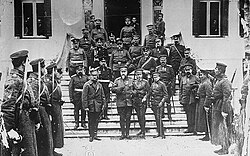
Back Entente Cordiale Afrikaans الاتفاق الودي Arabic الاتفاق الودى ARZ Англа-французскае пагадненне (1904) Byelorussian Сърдечно съглашение Bulgarian Entente Cordiale Catalan Srdečná dohoda Czech Entente Danish Entente cordiale German Αντάντ Greek
 | |
| Signed | 8 April 1904 |
|---|---|
| Signatories | |
| Languages | French, English |
| Foreign alliances of France | |||||||||||||||||||||||||||||||||||||||||||||||||||||||||||||
|---|---|---|---|---|---|---|---|---|---|---|---|---|---|---|---|---|---|---|---|---|---|---|---|---|---|---|---|---|---|---|---|---|---|---|---|---|---|---|---|---|---|---|---|---|---|---|---|---|---|---|---|---|---|---|---|---|---|---|---|---|---|
| |||||||||||||||||||||||||||||||||||||||||||||||||||||||||||||
| Events leading to World War I |
|---|
 |
|
The Entente Cordiale (French pronunciation: [ɑ̃tɑ̃t kɔʁdjal]; lit. 'Cordial Agreement') comprised a series of agreements signed on 8 April 1904 between the United Kingdom and the French Republic which saw a significant improvement in Anglo-French relations. On the surface, the agreement dealt with minor issues related to fishing and colonial boundaries. Egypt was recognized as part of Britain's sphere of influence, and Morocco as part of France's. The Entente was not a formal alliance and did not involve close collaboration, nor was it intended to be directed against Germany. However, it paved the way for a stronger relationship between France and Britain in the face of German aggression. It should not be mistaken for the official Anglo-French military alliance, which was only established after the outbreak of World War I in 1914.[1]
The main colonial agreement was the recognition that Egypt was fully in the British sphere of influence and likewise Morocco in France's, with the proviso that France's eventual dispositions for Morocco include reasonable allowance for Spain's interests there. At the same time, Britain ceded the Los Islands (off French Guinea) to France, defined the frontier of Nigeria in France's favour, and agreed to French control of the upper Gambia valley; while France renounced its exclusive right to certain fisheries off Newfoundland. Furthermore, French and British proposed zones of influence in Siam (Thailand), which was eventually decided not to be colonised, were outlined, with the eastern territories, adjacent to French Indochina, becoming a proposed French zone, and the western, adjacent to Burmese Tenasserim, a proposed British zone. Arrangements were also made to allay the rivalry between British and French colonists in the New Hebrides.
In long-term perspective, the Entente Cordiale marked the end of almost a thousand years of intermittent conflict between the two states and their predecessors, and replaced the modus vivendi that had existed since the end of the Napoleonic Wars in 1815 with a more formal agreement.[2] The Entente Cordiale represented the culmination of the policy of Théophile Delcassé (France's foreign minister from 1898 to 1905), who believed that a Franco-British understanding would give France some security in Western Europe against any German system of alliances (see Triple Alliance (1882)). Credit for the success of the negotiation of the Entente Cordiale belongs chiefly to Paul Cambon (France's ambassador in London from 1898 to 1920) and to the British Foreign Secretary, Lord Lansdowne. In signing of the Entente Cordiale both powers reduced the virtual isolation into which they each had withdrawn. Britain had no major-power ally apart from Japan (1902). France had only the Franco-Russian Alliance. The agreement threatened Germany, whose policy had long relied on Franco-British antagonism. A German attempt to check the French in Morocco in 1905 (the Tangier Incident, or First Moroccan Crisis), and thus to upset the Entente, served only to strengthen it. Military discussions between the French and the British general staffs were initiated. Franco-British solidarity was confirmed at the Algeciras Conference (1906) and reconfirmed in the Second Moroccan Crisis (1911).
© MMXXIII Rich X Search. We shall prevail. All rights reserved. Rich X Search